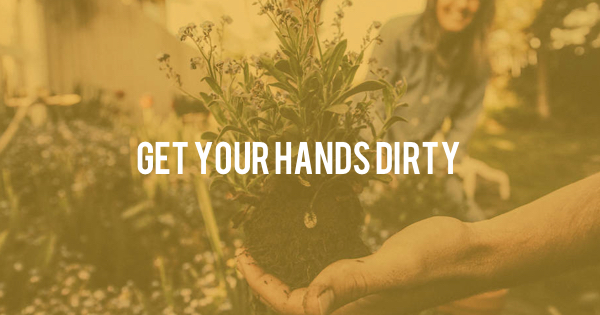As a practitioner you know what to buy, who to ask, how things work (and don’t) because you’re practicing. You’re getting your hands dirty, ask annoying „why“ questions and actually try things out.
As a non-practitioner, you superficially read about it in an article where someone else pre-chewed the information so the gum has become soft and easy to swallow. It’s ok to read about things beforehand. It’s good to get an idea about it.
Like pre-reading about the movie you’re willing to watch next Thursday, you wouldn’t want to only read about it but move your butt into the cinema hall, sit down, shut up and watch it. You don’t want to call yourself a film expert when the only thing you’ve seen were film reviews written by others. How much of a practitioner would you be?
Also, Snapchat is popularly known because of its weird interface that some people really have a problem to learn. They read texts of others who complain about this ugly user experience and don’t even start using Snapchat because of it. Among others, they’re missing out on business opportunities (one-on-one interaction) on one of the fastest growing social networks. You don’t understand the value of having automatically deleted conversations (disregarding the new „Memories“ function) through video, audio, and photo if you never tried.
You’re acting like a blindly following sheep if you only hear others’ opinions and never dig deeper. Opinions can be made out of another person’s opinion which is replicated by another person that is a replicate of what someone else said. You can either echo the same message — although the result would probably be in the style of the „Chinese whispers“ children’s game — or investigate time, sweat and blood like a good journalist tracing back the trail.
Practicing cleaning households as a professional (I get paid for it), I can tell that people who don’t really clean their house buy products where it says „Use for bathroom“, „Use for kitchen“ or „Use for furniture“. A non-practicing consumer with no idea is blindfolded and would buy anything where the promised label or promising salesman tells him to do so.
You don’t need to become an expert in a field that you’re only tangibly interested in but at least try out how things out once or a few more times so you learn to understand the challenges and difficulties of that field.
For example, cleaning windows you can use very sophisticated sponges, liquids, and tools. As a practitioner, I can tell you that the easiest thing to clean your windows and make them shine is:
- An ordinary glass cleaner in spray bottle
- One micro fibre cloth
- One kitchen towel (or waffle towel)
- Optional for very dirty windows: All purpose cleaner liquid mixed with water cleaned with household towel by Zewa or other brands
For a not so dirty window, you spray glass cleaner on the window and make circular movements with the micro fibre cloth to clean the window until the dirt is off. For the polishing, you use the kitchen towel and apply circular movements as well until no dirt and no streaks are visible anymore. Done.
The takeaway from today: You not only learned how to properly clean a window so it shines bright like a diamond. You also received a reminder on how valuable practicing is.
For example, although I’m theoretically able to read and write source code for writing software applications I’m far from being a practitioner because I don’t write code on a regular basis. Therefore I don’t call myself a programmer or developer.
Practice shows you if enjoy the process of doing it. When you do, you can start teaching others. You can then be very meta, abstract and „in the clouds“ but only because you started making in the dirt — making your hands dirty. Start dirt. You can always „cloudly clean“ yourself after.
_
This was episode 68 of the #weekdaykickoff 🌊. Every weekday (Mon-Fri). Also find me on Anchor so we can talk — literally talk from person to person!
Also published on Medium.
